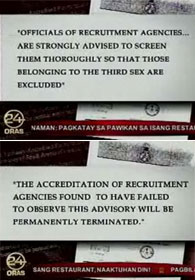The Philipines-based GMA News on Jun 2 reported that the consular section of the Royal Embassy of Saudi Arabia has sent a memorandum dated May 26 instructing recruitment agencies in Manila to be stricter in screening job applicants bound for the country said to be the top destination for migrant Filipino workers.

“Officials of recruitment agencies who are responsible in conducting interviews of job applicants to Saudi Arabia are strongly advised to screen them thoroughly so that those belonging to the third sex are excluded," the memo read.
It also warned that non-compliant agencies will have their accreditation permanently terminated.
It is not known what prompted the memo.
Last June, 67 Filipino men were arrested after they were found cross-dressing and drinking at a private party near the capital city of Riyadh. The men were subsequently sentenced to imprisonment and flogging but were pardoned and released in July the same year. None were charged with homosexual acts, a much more serious charge under Saudi law.
GMA News quoted Vice Consul Roussel Reyes of the Philippine Embassy in Riyadh as saying that nearly 50 other Filipinos have been arrested and jailed in the past for similar violations. The report added that men caught wearing even just one article of women’s clothing could face three to six months imprisonment, and suffer between 50 and 100 lashes with a rattan stick.
According to the International Lesbian and Gay Association, sodomy is illegal and punishable by death by stoning under Saudi-Arabia's Sharia law. All sexual relations outside of marriage are illegal, including sexual relations between women.
Danton Remoto, Chairman Emeritus of Ang Ladlad, a LGBT advocacy group acknowledged that while the Saudi government has the right to implement its own policie, prohibiting the recruitment of gay and lesbian workers is tantamount to discrimination.
In an interview with “24 Oras" news programme, he added that it was not simply a matter of implementing the law but a human rights issue, as the policy would mean fewer job opportunities for Filipinos in the Saudi country. [An estimated 1 million Filipinos currently work in the Muslim nation of some 24 million, 6.36 million of whom are immigrants. An estimated 10 percent of the Philippines's population, or nearly 8 million people, work overseas.]
He further questioned how the Saudi government plans to implement the policy, particularly on determining whether a worker is gay or not. “How will the screening work? Will it based on hair length, or one’s raising of an eyebrow?" he asked wryly.
While the Middle East chapter of migrants’ rights group Migrante International urged Philippine authorities to clarify the new policy, the Overseas Workers Welfare Administration (OWWA) has advised Overseas Filipino Workers (OFW) to be more careful with their demeanor while in the Kingdom to avoid being arrested.
“What happens is wherever we are, if we violate the laws of our host country, offenses will have corresponding sanctions," said OWWA director for policy and program development Vivian Tornea.
